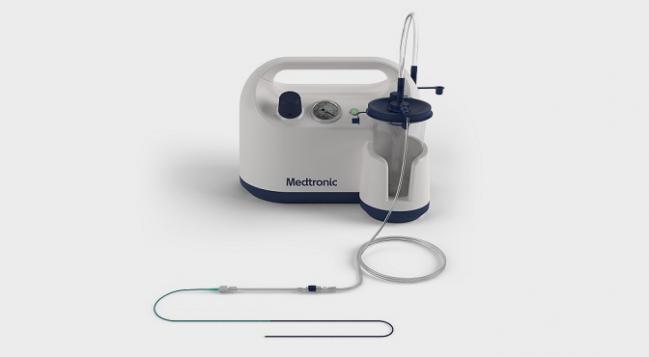Medtronic’s Riptide System Cleared for Thrombus Aspiration in Acute Stroke
The system is the second device to be given the FDA’s OK for thrombus aspiration.

The Riptide Aspiration System (Medtronic) has been cleared by the US Food and Drug Administration (FDA) for thrombus removal in the setting of acute ischemic stroke, making it the second system—after Penumbra’s—with a labeled indication for that purpose, Medtronic announced today.
The agency’s decision, made December 21, 2017, was based on nonclinical bench and animal testing showing that Medtronic’s setup—which includes the company’s already-approved Arc intracranial support catheter, aspiration tubing, a pump, and a collection canister—is “substantially equivalent” to Penumbra’s aspiration system, which was first approved in 2007.
The Riptide system “is intended for use in the revascularization of patients with acute ischemic stroke secondary to intracranial large-vessel occlusive disease (within the internal carotid, middle cerebral—M1 and M2 segments, basilar, and vertebral arteries) within 8 hours of symptom onset,” according to the FDA’s 510(k) summary. “Patients who are ineligible for intravenous tissue plasminogen activator (IV tPA) or who fail IV tPA therapy are candidates for treatment.”
Although Penumbra’s system is the only one that has had a labeled indication for thrombus aspiration in acute stroke over the past decade, clinicians have been using guide catheters from other companies in an off-label fashion, leading the FDA to send a letter clarifying the differences between the two types of catheters last year.
Interest in aspiration as an adjunct or alternative to stent retrievers—which are strongly recommended in the guidelines for acute ischemic strokes caused by large-vessel occlusions—seems to be growing, with the ASTER and Penumbra Separator 3D trials showing that aspiration alone provides results similar to those seen with stent retrievers. Results of a third trial, COMPASS, will be presented next week at the International Stroke Conference in Los Angeles, CA.
Speaking with TCTMD for a previous story, Adnan Siddiqui, MD, PhD (University at Buffalo, NY), said that if COMPASS provides results similar to those seen in the other two trials, then there will be enough evidence to support a class I recommendation for aspiration alone alongside stent retrievers.
Photo Credit: Medtronic
Todd Neale is the Associate News Editor for TCTMD and a Senior Medical Journalist. He got his start in journalism at …
Read Full BioSources
Medtronic. Medtronic receives FDA clearance for Riptide Aspiration System. Published and Accessed on: January 16, 2018.


Comments